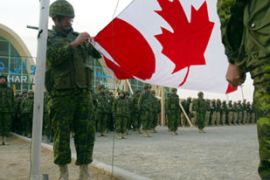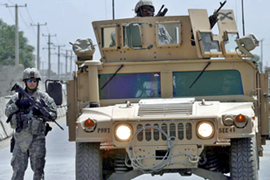US report warns of Afghan failure
Study says Nato’s commitment to mission fading as Canada threatens pullout.

Published On 31 Jan 2008
It recommended Nato send more troops to Afghanistan and the US appoint an envoy to the country.
The document said that failure to defeat resurgent pro-Taliban groups could destabilise neighbouring Pakistan and threaten the future of Nato co-operation on Afghanistan.
Follow-up study
The voluntary study was published by the Centre for the Study of the Presidency, a Washington-based group, as a follow-up to the Iraq Study Group report, which was published in late 2006.
The senate is due to question the Afghan report’s co-chairmen, retired US General James Jones and Thomas Pickering, a former US ambassador to the UN, at a hearing on Thursday.
Pickering told Al Jazeera the outlook was bleak for Afghanistan and that the country was losing ground in terms of governance, development and security.
“We need an overall strategic plan to deal with this and we haven’t seen one yet.”
| External link |
Robert Gates, the US defence secretary, said he had not read the report but struck a more optimistic note on Afghanistan’s future.
“I would say that the security situation is good,” he said.
Gates said more troops were needed in Afghanistan, but “certainly not ours”.
Another report on Afghanistan by the Atlantic Council, a US think-tank, was also released on Wednesday and made similar recommendations.
The reports come as Nato urged Canada to keep its 2,500 troops in Afghanistan’s Kandahar region, pledging to find the 1,000 extra troops Canada wants if it is to stay beyond 2009.
On Wednesday Stephen Harper, the Canadian prime minister, told George Bush, the US president, that he will end the mission unless another Nato member deploys troops to the volatile southern region.
Sandra Buckler, a spokeswoman for Harper, said the prime minister “underscored that, unless Canada was able to meet the conditions specified by the panel of additional combat troops and equipment from Nato allies, Canada’s mission in Afghanistan will not be extended”.
Dangerous region
The Afghanistan Study Group inquiry made over 30 recommendations.
“One would think a military and political intervention of the magnitude of Afghanistan that there would be a unified strategy in place, sadly we see some very fragmented policy leadership,” said Paul Burton, director of policy analysis at the Senlis Council, a security and development research institute.
Speaking to Al Jazeera, Burton called the report “very timely indeed” and said it needed to make “a big impact within the US polity community which thus far has been negligent in its Afghanistan strategy”.
 |
| The US says it will not send any more of its own troops to Afghanistan [EPA] |
Burton said more troops were needed and that more Nato states needed to commit their troops to fighting in Afghanistan.
“One has to remember there are only essentially four Nato states engaged in active combat against a particularly virulent insurgency,” he said.
“That needs to change immediately.”
All 26 Nato nations have soldiers serving with the allied forces in Afghanistan, which currently stands at 42,000 troops.
Military commanders say they remain hamstrung by restrictions that some nations place on what their troops can do.
National restrictions keep troops from several European countries from operating in the most volatile provinces, such as the dangerous Kandahar region where Canada’s forces are based.
Source: Al Jazeera, News Agencies